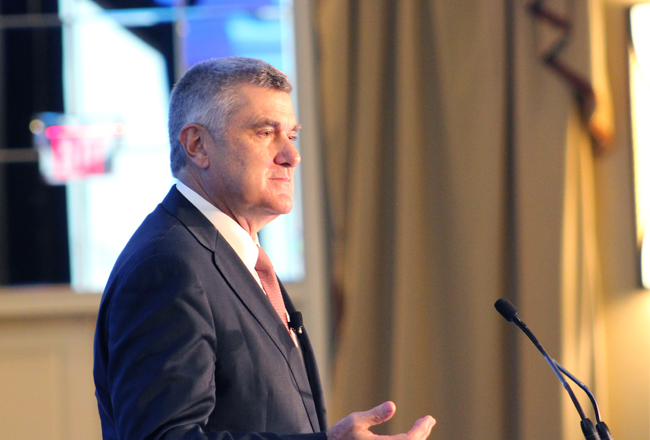Memorial Sloan Kettering Cancer Center CEO Craig B. Thompson told a Westchester audience of business and health care professionals that the specialty cancer hospital is in the county to work with other care providers, not to compete.
The role of its outpatient cancer center in Harrison, Thompson said, is to “be the innovation leader” and bring new forms of cancer treatment to all hospitals.
“We”™re here to add to and improve the health care quality of people who live in Westchester and work in Westchester”¦ we”™re not here to compete,” he said.

Thompson made his comments as the keynote speaker at the Westchester County Association”™s annual Health Tech conference on Oct. 12 at the Doubletree Hotel in Tarrytown. The half-day event featured panels and an awards presentation.
Thompson gave a history of advances in cancer treatment and discussed how specialty hospitals can work with the county”™s health care systems to provide better care.
Memorial Sloan Kettering opened a 114,000-square-foot outpatient cancer facility in 2014 at 500 Westchester Ave., but Thompson noted the Manhattan-based cancer hospital”™s roots in the county go back beyond that. The hospital operated for nearly 20 years at Phelps Hospital in Sleepy Hollow, before Phelps became part of the Northwell Health system in 2014.
Thompson said cancer is now the No. 1 leading cause of death and hospitalization for people between ages 35 and 65, with cardiovascular disease a distant second.
“Cancer is a really scary disease for the people in your company, the patients you care for,” Thompson said. “It”™s what Americans fear most for the health of themselves and their family.”
“The reality is,” Thompson said, “50 percent of males will get diagnosed with cancer and now”¦ we used to say it was a third of women, this year it passes 40 percent.”
Thompson said the first question he is typically asked, as CEO of the oldest and largest private cancer hospital in the country, is “Why haven”™t we cured cancer?”
“Well, we have,” Thompson said he typically responds. “We”™ve cured a large number of cancers, and unfortunately cancer is a lot more complex disease than when we started off.”
There are more than 400 types of cancer, he said, each requiring a different treatment and a different set of expertise.
And progress has been made as treatment shifted from just chemotherapy to strategies that target individual types of cancer cells, Thompson said. Since 1990, there”™s been a 1 percent decrease per year in the mortality of all forms of cancer in the U.S.
More than 70 percent of cancer patients at Memorial Sloan Kettering are “alive and well” five years after diagnosis, according to Thompson.
He stressed that Westchester has a number of medical centers that provide strong oncology care, but added that specialty hospitals such as Memorial Sloan Kettering provide an important second option. Memorial Sloan Kettering, he said, can offer more than 300 clinical trials in Westchester.
He cited obesity as an example of the need for collaboration between health networks and specialty hospitals. For the last decade, obesity caused by an increasingly sedentary lifestyle has become the leading cause of preventable cancer in America.
“We need a partnership with the other great accountable care organizations,” Thompson said. “We don”™t do obesity, we don”™t do diabetes” at Memorial Sloan Kettering.
This was the fourth year for the Health Tech conference, which also featured panels on telehealth and the opioid crisis, along with a presentation on the future of the Affordable Care Act.





















